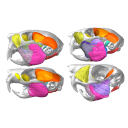

















| Plane | Position | Flip |
| Show planes | Show edges |
0.0
M3#1490
Masticatory apparatus of Zenkerella
Data citation:
LÊa Da Cunha , Pierre-Henri Fabre
and Lionel Hautier
, 2024. M3#1490. doi: 10.18563/m3.sf.1490
Main model solid/transparent
Show/Hide main model
Second model transparent/solid
Show/Hide second model
Flags:
anterior belly of the digastric, anterior deep masseter, aponeurosis of the superficial masseter, external pterygoid, internal pterygoid, lateral temporal, mandible, medial temporal, orbital portion of the infraorbital part of the zygomaticomandibularis, orbital temporal, posterior belly of the digastric, posterior deep masseter, rostral portion of the infraorbital part of the zygomaticomandibularis, skull, superficial masseter, tendon of the digastric, tendon of the zygomaticomandibularis, transverse mandibular, zygomaticomandibularis

|
3D models related to the publication: Springhares, flying and flightless scaly-tailed squirrels (Anomaluromorpha, Rodentia) are the squirrely mouse: comparative anatomy of the masticatory musculature and its implications on the evolution of hystricomorphy in rodents
|
|